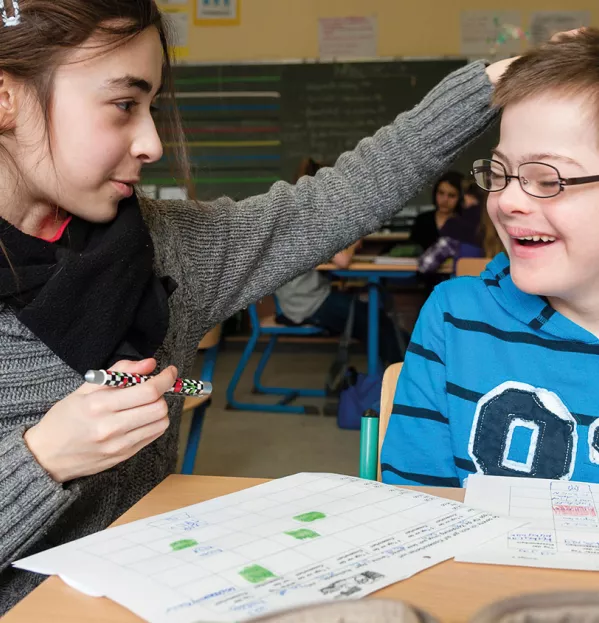Who is inclusion really about?

Despite its being a fundamental part of every teacher’s working life, I still frequently get asked what inclusion is and who it is for. It’s a strange but understandable phenomenon. And it happens because inclusion is such a slippery, nebulous concept.
Is it about schools? About society? About transforming society? Does it mean we should all be educated in the same place, or separately? Is it about friendship? Or knowledge? Or access to opportunities? Does it look the same, no matter where or when you are?
I have a personal and distinctly non-theoretical perspective on this: I am teacher and a parent of a disabled child. When my son was born, he was diagnosed with Down’s syndrome and, instead of the celebration that is traditional upon receipt of a new baby, there were long faces and serious conversations.
Instead of congratulations and balloons, I was given a leaflet full of scary pictures and scary possibilities. Instead of a pat on the back and a cup of tea, I was made to feel that I had failed, that I somehow hadn’t had a real baby; that he was, somehow, a monster. Instead of joy, there was mourning. Instead of being sent home, we were sent for a heart scan. It was hard, and I was angry about the experience for a long time.
Because, you see, I was a teacher and I knew a different story from the one I felt I was being told. I knew that children come in all shapes and sizes, and they all have a unique set of skills and talents, challenges or special learning needs. And, despite what we might think we know about them when they are born, the future is unwritten for every single one of them. As a teacher, I am in many ways a dealer in hope, in possibilities and in change; I know the danger of the self-fulfilling prophecy.
When my son went to a mainstream primary school - this momentous event in any parent’s life, the first step away for your first born - he walked up the road just like everyone else: same uniform, same book bag (same nits!); then, later on, he went to all the birthday discos, doing all of those things they all do.
When I look back on it, I can be honest and say it was actually about me. It was me demanding a public acknowledgement that my child was just as good as anyone else’s. It was a declaration that neither he nor I, were a failure, and that he certainly wasn’t a monster. It was a political statement about his right to be here, to participate in the everyday things of everyday life. It was a personal reclamation of joy.
Questioning the ‘SEND industry’
The reality of impairment, is, of course, very different from the image. The reality is providing a lot of hard work and dedication - and support - for those at the sharp end. So much so, that it is entirely possible to describe people like me, who make their living by supporting learners with additional requirements to the “norm”, as being a “SEND industry”. And in my view, it is entirely legitimate to question that industry; to ask “Who are you serving? Whose needs are the most important here?”
And in the end, that is where I keep ending up: although inclusion is about me, it is about us all and who we want to be. It is also, fundamentally, about the child.
Children like the little boy mine once was should be included in our schools, not to make me feel better, not to make us collectively feel better, and certainly not to make him better. But because he will eventually grow up. He has an academic entitlement that will enable him to participate in the cultural life of his community; so he can go to the library, for instance, and take out a book he will enjoy and which will enrich his life. He is entitled to learn the skills and knowledge he will need to make a contribution. He, like his typically developing peers, needs to know what it is to have a friend, as well as to be that friend. He needs to learn how to keep himself safe, and those around him to learn how to help.
Inclusion is about us all. It’s a recognition and a reclamation of our shared humanity - that, as a species, we are diverse, but that we are more alike than different. It’s not the sort of thing you can put in a jar and take out to examine, ingredients mixed perfectly, a fixed object. It’s a process, a journey, something we learn together. It’s about me; it’s about you. It’s about him.
Nancy Gedge is a teacher and Tes SEND columnist
You need a Tes subscription to read this article
Subscribe now to read this article and get other subscriber-only content:
- Unlimited access to all Tes magazine content
- Exclusive subscriber-only stories
- Award-winning email newsletters
Already a subscriber? Log in
You need a subscription to read this article
Subscribe now to read this article and get other subscriber-only content, including:
- Unlimited access to all Tes magazine content
- Exclusive subscriber-only stories
- Award-winning email newsletters